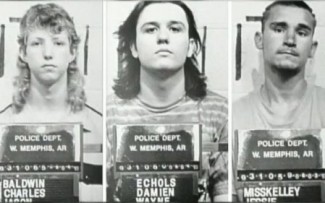West of Memphis (Amy Berg, 2012): New Zealand
Reviewed by Christopher Connor. Viewed at the Santa Barbara Film Festival.
Amy Berg’s new documentary, West of Memphis, produced by Peter Jackson, takes a chilling look at the failure of the Arkansas justice system and how it falsely accused three young men, and even sentenced one to death, for the murder of three children. From interviews with the victim’s families to the convicted themselves, we are given an in depth look at the process of proving these men innocent with shocking new information, exposing the witch hunt that initially led to their arrest, and trying to give new answers.
On May 5, 1993, three boys, Stevie Branch, Christopher Byers, and Michael Moore were reported missing. The documentary begins with the retelling of the boys’ disappearance by Stevie’s mother and we are soon led to the grisly discovery of their bodies in a creek nearby. The main suspects were three teenage boys, Damien Echols, Jason Baldwin, and Jessie Misskelly on the basis that the murders were some sort of satanic ritual, the children being hogtied by their shoelaces with visible cuts and lacerations on their bodies. The young men were already known around the town to be different: they listened to metal music, wore black clothes, and drew dark imagery in notebooks. Because of this, they were quickly pegged as the murderers. The trial soon took place in 1994 with Echols and Baldwin being tried together and Misskelly separate. All three were eventually convicted, with Echols being given a death sentence.
As the documentary unfolds, we are shown the blatant misconduct, lies, and malpractice of the trial as well as the initial police investigation at the crime scene, and we begin to realize that there is substantial proof that these three young men, now adults, were wrongfully imprisoned. With countless supporters, which include Eddie Vedder and Henry Rollins, we witness how much work the supporters of the West Memphis 3 go through and how this in turn effects those actually behind the bars. By the end, the three are released under a rarely used plea bargain called the Alford Plea which let’s them maintain their innocence while still being technically guilty. As offensive as it is to the three, it was a choice made to avoid a potentially much longer retrial.
But the purpose of the documentary is two fold. It doesn’t only stress and illustrate the innocence of the three, but tries to illuminate what truly did happen. And West of Memphis points its finger directly at Terry Hobbs, the step father of Stevie Branch. We are given compelling evidence, spanning from DNA to testimonies, and reason as to why he would have committed the murders. Although not closing the case on his guilt, we are left with little doubt that Terry Hobbs should be the main suspect in the murder of the children.
With all documentaries, as well as movies in general, we are being manipulated through what the director decides what we see. But with West of Memphis, we don’t feel manipulated or cheated. The reality presented is one that can be easily accepted. It feels authentic. It is one we know we live in, even when faced with new, sometimes difficult, realizations that not everything is as we are told.
West of Memphis is done extremely well. At the end of the two and a half hours, that really feels like a span of five minutes, we are left shocked and reeling, millions of questions flying through our heads. With editing and cinematography that compliments the disturbing images and somber tone of the film, we go through a variety of emotions throughout. Disgust, anger, sadness, hopelessness, and even joy. We are not only left with an intense mix of emotions, but we are left with just as many, if not more questions. How can someone just lose eighteen years of their life like that? How can the judicial system be so flawed? Can this happen again? With these questions, we realize the movie takes this specific case and brings to light an even bigger issue: this isn’t an isolated problem. This in itself leads to more questions. What can we do about it? How many people are truly innocent and are living their life unjustly behind bars? Like all good documentaries, West of Memphis doesn’t just provide us answers and solutions, but more importantly, gives us the desire to find out more. West of Memphis gives us the need for truth.
About this entry
You’re currently reading “West of Memphis (Amy Berg, 2012): New Zealand,” an entry on Student Film Reviews
- Published:
- 02.10.12 / 5pm
- Category:
- Films, Santa Barbara Film Festival 2012

3 Comments
Jump to comment form | comments rss [?] | trackback uri [?]